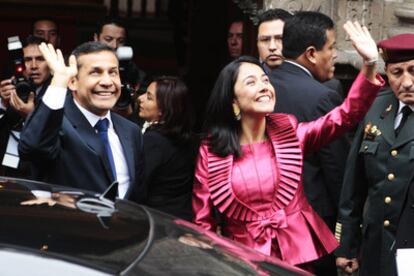Peru's Humala pledges social reform
Incoming president sparks fury among opposition with inaugural oath
Ollanta Humala, a left-leaning former army commander, was sworn in on Thursday as Peru's new president, and immediately announced a battery of social programs designed to eliminate poverty and combat inequality.
The flamboyant 49-year-old gave a 50-minute inaugural address, which was interrupted with cheers and heckles from the crowd. Peru was bitterly divided during the weeks leading up to the runoff race on June 4 when Humala captured the presidency with nearly 52 percent of the vote over his rival Keiko Fujimori, who won 48 percent.
Humala has said he would take his government to remote places, where it can be of service to people. "The state has refused to go up the Andes or dig deep into the Amazon. But we need more government there," he said.
"He offers too many things that the state doesn't have the capacity to cover"
Among his pledges, Humala promised he would raise the monthly minimum wage in two stages to reach 750 sols (or about 200 euros). The president also said he would introduce a string of government-funded social-assistance programs, including a mandatory pension for elderly people living in extreme poverty, to be known as Pension 65; free lunches at all public schools; and national scholarships for university students facing hardship.
"Each change, for it to be sustainable, should be gradual and reasonable," he said.
But some analysts are already ringing up the price tag for Humala's proposals, predicting that they cannot be introduced in the short term.
"I think he offered too many things that the state doesn't have the capacity to cover. For example, and this is just a simple estimate, Pension 65 could cost some $2 billion annually," says Carlos Andrianzén, an economic professor at the Peruvian University of Applied Sciences (UPC), as quoted in the Lima daily El Comercio.
Humala made no mention in his inaugural address about any proposed changes to the Constitution. And while he assured the opposition that he would not foment confrontation, his first words appeared to suggest the exact opposite.
Humala said he was taking his oath "in the spirit, in the principles and with the values outlined in the 1979 Constitution." His comments immediately set off yells of protest and whistling from the Fujimori supporters attending the ceremony.
Keiko Fujimori's father, the former President Alberto Fujimori, who is serving a 25-year sentence for human rights abuses, redrafted the Constitution in 1993.
The comments marred Humala's entire ceremony, which was attended by many heads of state from Latin America, with constant heckling and jeers from the opposition. During the campaign, Humala was forced to tone down his left-leaning nationalist rhetoric to appeal to all voters.
One poll released on Sunday showed that 69.6 percent of Peruvians were optimistic about Humala's plans for the economy and social reforms after hearing the president's speech.
In respect to foreign policy, Humala said he would respect all the trade agreements "signed with friendly nations and blocs." He has promised to continue to carry out many of the economic policies introduced by previous governments in an effort not to scare away investors.
Many even applauded Humala's picks for his new Cabinet, including his choice for finance minister, Luis Miguel Castilla, 42, who served as deputy finance minister during the 2006-2011 administration of Alan García.
Salomón Lerner Ghitis, who served as head of the development office under President Alejandro Toledo's past government, will serve as prime minister. For his culture minister, Humala selected internationally renowned singer Susana Baca.

Tu suscripción se está usando en otro dispositivo
¿Quieres añadir otro usuario a tu suscripción?
Si continúas leyendo en este dispositivo, no se podrá leer en el otro.
FlechaTu suscripción se está usando en otro dispositivo y solo puedes acceder a EL PAÍS desde un dispositivo a la vez.
Si quieres compartir tu cuenta, cambia tu suscripción a la modalidad Premium, así podrás añadir otro usuario. Cada uno accederá con su propia cuenta de email, lo que os permitirá personalizar vuestra experiencia en EL PAÍS.
¿Tienes una suscripción de empresa? Accede aquí para contratar más cuentas.
En el caso de no saber quién está usando tu cuenta, te recomendamos cambiar tu contraseña aquí.
Si decides continuar compartiendo tu cuenta, este mensaje se mostrará en tu dispositivo y en el de la otra persona que está usando tu cuenta de forma indefinida, afectando a tu experiencia de lectura. Puedes consultar aquí los términos y condiciones de la suscripción digital.








































